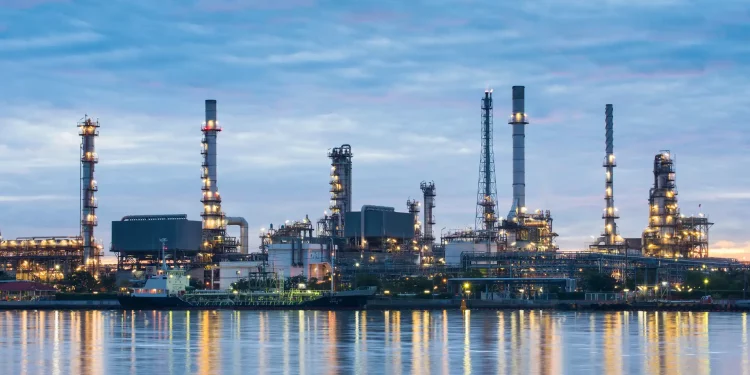The United Arab Emirates (UAE) has ramped up its oil production amidst global turmoil. Simultaneously, its neighbour Saudi Arabia is cutting down on its oil output, and a mutual friend Russia is selling its crude at a discount to keep its economy afloat.
Back in June, the Organisation of the Petroleum Exporting Countries (OPEC), a Saudi-led oil cartel and the OPEC+ headed by Russia, decided to reform their energy policy. UAE put forward its long-term goal to be allowed to increase its oil production.
In the same meeting, UAE quashed the idea of a production cut, whilst the Saudi Kingdom cut down on production to artificially inflate prices by reducing supply to the oil market. Recently, Saudi Arabia further decreased its output, carrying forward its reduction of a million barrels per day into the next month.
As per the proposed plan of UAE, the Emirates will raise its production by 200,000 barrels per day (bpd) next year up to 3.2 million barrels. This decision is taken while the international benchmark Brent crude price bounces back to cross the mark of $80 per barrel.
Industry players comment that major producers like Saudi Arabia and Russia are decreasing their output, so the UAE must at least cut down to some extent. This has instead led to Saudi Arabia working to boost oil prices and the UAE selling at a premium of 15% since the last month.
Earlier, the Saudi Kingdom had to struggle with the immense supply of discounted Russian crude in the market. Russia is focusing on capturing the Asian market and has emerged as the largest producer amongst the OPEC+ member. This time Saudi is again caught in the trouble of oil cuts to inflate prices.
History of UAE-Saudi relations
The United Arab Emirates and Saudi Arabia have been almost on the same side of the court for decades. During the Arab Spring, they collaborated to fight against anything that possessed even the slightest danger to their countries. They used their power to seal the borders of their mutual neighbour, Qatar, and deployed their might to support Khalifa Haftar in Libya. They even lent their resources to back defence forces to topple the government of Bashar al–Assad in Syria. They sent their military to fight against the Iran-backed forces in Yemen.
In recent times, relations between the two US allies have taken some hits. The duo of authoritarian rulers, the UAE President Sheikh Mohamed bin Zayed al-Nahyan and the Saudi Crown Prince Mohammed Bin Salman have witnessed some tense confrontations. A Wall Street Journal report published last December reported that the Saudi crown prince had warned of a possible blockade of the UAE.
Economic and political perspectives are mainly the reasons for bitterness between countries. The UAE backed away from the Yemen war in 2019 but kept supporting a separatist group in southern Yemen that has fought with the Saudi-backed globally recognised government of Yemen. Differences escalated in 2021 when both nations were at the forefront of a serious disagreement over the oil reforms. UAE raised its complaints in an OPEC+ meeting that it has a low baseline for the calculation of the allowed oil production.
After the Russia-Ukraine conflict, Yousef al-Otaiba, the UAE ambassador to the US, said that Abu Dhabi wants to increase its oil production considering the rise in demand and would put forth such a proposal amongst the OPEC members. The UAE has made a series of significant investments to boost its oil production capacity. It has an aim to pump 5 million bpd by the end of 2027.
Greg Priddy, a consultant at the Spout Run Advisory and a senior fellow at the Center for the National Interest in Washington, DC, told media outlets that the UAE is richer than Saudi Arabia on a per capita basis. This has made Saudi more tense about the short-term price volatility as it might also affect government spending. He highlighted that Saudi Arabia is such a populated country and is more sensitive to daily oil price moves. The popularity of the crown prince faces the brunt if the oil prices go down south.
Saudi caught off guard
The UAE has succeeded in luring Russian oil traders to get hold of a hideout from the clutches of Western sanctions. The port of Fujairah has emerged as a pivotal hub for transshipment of Russian crude. Dubai, one of seven emirates within the UAE, has seen welcomed Russian energy traders with its charm.
On the other end, Saudi Arabia is reducing its stringent social reforms to attract more businesses to the nation, just like its rival Dubai. But it hasn’t received many foreigners. An energy consultant commented that considering the alcohol ban in the country, people don’t want to live there, they want Russians to live there and not have vodka, that’s unacceptable.
Saudi Arabia has leaped way ahead in one sector, petrochemicals. The Saudi oil company Aramco has managed to create a strong foothold downstream of oil and gas production by every means. The demand for refined polymers and compounds is more likely to stay alive even when the oil demand goes down. Here, Saudi Arabia caught UAE’s government-backed oil company, ADNOC, off guard.


















